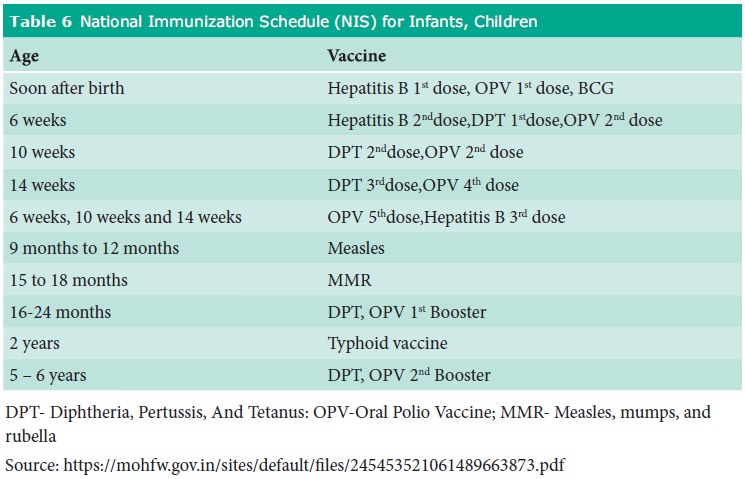Chapter: 11th Home Science : Chapter 6 : Family Meal Management
Nutritional Needs of Infants
Nutritional Needs of Infants
Infancy is a period of rapid
growth. The development during infancy is more rapid than during at any other
period in the life time of an individual.
Growth and Development
The growth and development is accompa-nied by a number of
physiological changes which include changes in body size and body composition,
changes in the gastro intestinal system, excretory system and circulatory
sys-tem. Nutrition is crucial and proper dietary modifications are vital during
this period.
Immunization
Malnutrition during infancy leads to a high-er incidence
of infant mortality. Besides malnutrition,infection causes mortality.
Immunization protects the children against disease. Table 6 below presents the
immuni-zation schedule for infants and children.
Good nutrition is essential for the growth and development that occurs dur-ing an infant’s first year of life. As an infant’s mouth, tongue, and digestive tract mature, the infant shifts from being able to only suckle, swallow, and take in liquid foods, such as breast milk or infant formula, to being able to chew and receive a wide vari-ety of complementary foods.

Energy: Infants need energy from food for activity,
growth, and normal development. Energy comes from foods containing
car-bohydrate, protein, or fat. A general indi-cator of infant consuming an
adequate kil-ocalories per day is the infant’s growth rate in length, weight,
and head circumference.
Carbohydrate
The major type of carbohydrate normally consumed by young
infants is lac-tose, the carbohydrate source in breast milk. Lactose-free
infant formulas, such as soy-based infant formulas provide car-bohydrates in
the form of sucrose. In later infancy, infants derive carbohydrates from
additional sources including cereal and other grain products, fruits, and
vegetables.
Protein
Breast milk and infant formula contains protein. The
complementary foods such as meat, poultry, fish, egg yolks, cheese, yogurt,
pulses, cereals and other grain products provide adequate protein.
Fat
Breast milk and infant formula are impor-tant sources of
lipids, including essential fatty acids, during infancy.
Vitamin A
Breast milk and infant formula are major food sources of
vitamin A. Additional sources of vitamin A or carotenes for infants consuming
complementary foods include egg yolks, yellow and dark green leafy vegetables
and fruits e.g., spinach, greens, sweet potatoes and liver.
Vitamin E
Infants receive vitamin E from breast milk and infant
formula. Other vitamin E sources for older infants include green leafy
vegetables, vegetable oils and their products, wheat germ, whole-grain breads,
cereals and other fortified or enriched grain products, butter, liver, and egg
yolks.
Vitamin K
Sources of vitamin K include infant formula, green leafy
vegetables, pork, and liver.
Vitamin C
Breast milk and infant formulas are major food sources of
vitamin C. Additional vitamin C sources include vegetables (e.g., tomatoes),
fruits (e.g., citrus fruits, papaya, and strawberries), and regular fruit and
vegetable juices which are natu-rally high or fortified with vitamin C.
Vitamin B12
An infant’s vitamin B12 stores at birth
gen-erally supply his or her needs for approx-imately 8 months. Infants
consuming appropriate amounts of breast milk from mothers with adequate B12
stores or infant formula receive adequate amounts of this vitamin.
Complementary foods such as meat, egg yolks, and dairy products pro-vide this
vitamin later in infancy as well.
Calcium
An infant can obtain sufficient calcium by consuming
adequate amounts of breast milk or infant formula. Older infants can obtain
additional calcium from complementary foods such as yogurt, cheese, cottage
cheese (paneer), fortified or enriched grain prod-ucts, some green leafy
vegetables (such as turnip and greens), and tofu.
Iron
Sources of iron for infants
include breast milk, infant formula, meat, liver legumes, whole-grain breads,
cereals, or fortified or enriched grain products, and dark
green vegetables. Heme iron is found primarily in animal
tissues, including red meat, liver, poultry and fish and non-heme iron is found
in breast milk, infant formula, cereals, or other grain products legumes,
fruits and vegetables. Infants receive most of the iron in their diets as non
heme iron.
Tofu, or bean curd, is a popular food derived
from soya. It is a staple ingredient in Chinese cookery and is a good source of
protein, containing all eight essential amino acids. It is also an excellent
source of iron and calcium and the minerals man-ganese, selenium and
phosphorous.
Zinc
Infants obtain zinc from breast milk, infant formula,
meat, poultry, liver egg yolks, cheese, yogurt, legumes, and whole-grain
breads, cereals, and other fortified or enriched grain products.
Sodium
Healthy, full-term infants consuming pri-marily breast
milk or infant formula of standard dilution receive a relatively small amount
of sodium but an amount ade-quate for growth.
Fiber
Breast milk contains no dietary fiber, and infants generally
consume no fiber in the first 6 months of life. As complementary foods are
introduced to the diet, fiber intake increases. Dietary fiber is found in
legumes, whole grain foods, fruits, and vegetables.
Water
Infants’ water needs are met from
consum-ing breast milk, infant formula, and com-plementary foods. Water is also
formed in the body in chemical reactions occurring to metabolize protein, fats,
and carbohy-drates. Under normal circumstances, the water requirements of
healthy infants who are fed adequate amounts of breast milk or properly
reconstituted infant formula are met by the breast milk or infant for-mula
alone.
Related Topics